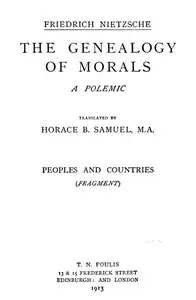"The Genealogy of Morals" by Friedrich Wilhelm Nietzsche is a thought-provoking exploration into the development of our ideas about right and wrong. It questions where our understanding of morality comes from, particularly the concepts of "good" and "evil." The book investigates how historical and psychological factors have influenced our values. It looks closely at how the values of the strong and privileged differ from those of the weak, and explores how resentment can shape moral beliefs. The material challenges readers to think critically about the roots of their own moral convictions and consider how culture impacts human thought.

The Genealogy of Morals The Complete Works, Volume Thirteen, edited by Dr. Oscar Levy.
By Friedrich Wilhelm Nietzsche
Uncover the hidden origins of good and evil as a philosopher challenges the very foundations of morality, dissecting how power and resentment shape our deepest values.
Summary
About the AuthorFriedrich Wilhelm Nietzsche was a German classical scholar, philosopher, and critic of culture, who became one of the most influential of all modern thinkers. He began his career as a classical philologist before turning to philosophy. He became the youngest person to hold the Chair of Classical Philology at the University of Basel in Switzerland in 1869, at the age of 24, but resigned in 1879 due to health problems that plagued him most of his life; he completed much of his core writing in the following decade. In 1889, at age 44, he suffered a collapse and afterward a complete loss of his mental faculties, with paralysis and probably vascular dementia. He lived his remaining years in the care of his mother until her death in 1897, and then with his sister Elisabeth Förster-Nietzsche. Nietzsche died in 1900, after experiencing pneumonia and multiple strokes.
Friedrich Wilhelm Nietzsche was a German classical scholar, philosopher, and critic of culture, who became one of the most influential of all modern thinkers. He began his career as a classical philologist before turning to philosophy. He became the youngest person to hold the Chair of Classical Philology at the University of Basel in Switzerland in 1869, at the age of 24, but resigned in 1879 due to health problems that plagued him most of his life; he completed much of his core writing in the following decade. In 1889, at age 44, he suffered a collapse and afterward a complete loss of his mental faculties, with paralysis and probably vascular dementia. He lived his remaining years in the care of his mother until her death in 1897, and then with his sister Elisabeth Förster-Nietzsche. Nietzsche died in 1900, after experiencing pneumonia and multiple strokes.



















